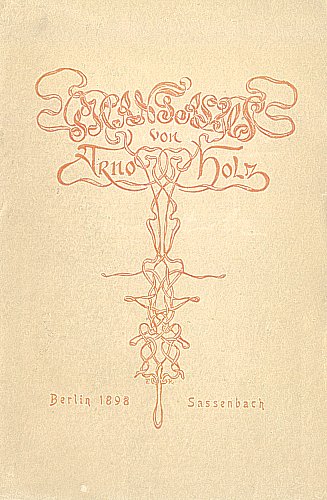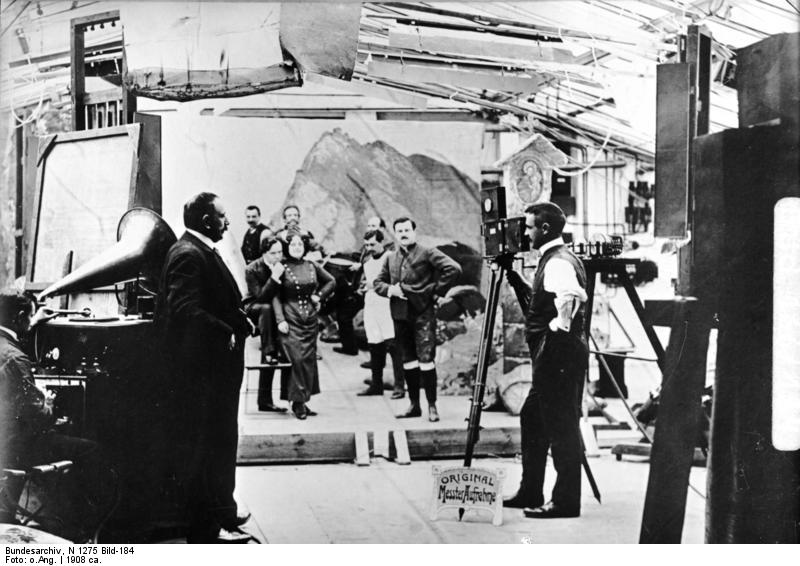|
Oskar Jerschke
Oskar Jerschke (July 17, 1861 – August 24, 1928) was a German playwright and collaborator of Arno Holz. Jerschke was born in Lähn, the son of a military engineer and raised in the rectory of his Uncle until his father settled in Strassburg. He studied law in Strasbourg and Berlin, settling in Strasbourg as an attorney. After the First World War, when Alsace and Strassburg came under French control, he was expelled to Berlin. There he published the tragicomedy ''Traumulus'' (The Dreamer) with his childhood friend Arno Holz in 1905. The work was a great success and a film version was made in 1936 directed by Carl Froelich Carl August Hugo Froelich (5 September 1875 – 12 February 1953) was a German film pioneer and film director. He was born and died in Berlin. Biography Apparatus builder and cameraman From 1903 Froelich was a colleague of Oskar Messter, one of ... and starring Emil Jannings. Jerschke died in Berlin, aged 67. Selected works * Deutsche Weisen (1884) wit ... [...More Info...] [...Related Items...] OR: [Wikipedia] [Google] [Baidu] |
Arno Holz
Arno Holz (26 April 1863 – October 1929) was a German naturalist poet and dramatist. He is best known for his poetry collection ''Phantasus'' (1898). He was nominated for a Nobel prize in literature nine times. Life and Works Holz was born in Rastenburg, East Prussia (now Kętrzyn, Poland), the son of pharmacist Hermann Holz and Franziska ''née'' Werner. The family moved to Berlin in 1875. After his schooling, Holz worked in 1881 as a journalist but chose a living as a freelance writer. He was beset with financial difficulties for much of his life. He established contacts with the Berlin naturalist club ''Durch'' where he met famed writer Gerhart Hauptmann. In 1885 his poetry collection, ''Buch der Zeit'' (book of time) won the Schiller Prize. Around this time, Holz was fascinated by Darwinism. From 1888 onward Holz lived and worked together with translator and writer Johannes Schlaf. Together they developed a theory of "consistent naturalism" in their programmatic text, '' ... [...More Info...] [...Related Items...] OR: [Wikipedia] [Google] [Baidu] |
The Dreamer (1936 Film)
''The Dreamer'' (german: Traumulus) is a 1936 German historical drama film directed by Carl Froelich and starring Emil Jannings, Hilde Weissner, and Harald Paulsen. It is based on the play of the same name by German playwrights Oskar Jerschke and Arno Holz. The film's art direction was by Franz Schroedter, a leading set designer of the era. It premiered at Berlin's Ufa-Palast am Zoo The Ufa-Palast am Zoo, located near Berlin Zoological Garden in the New West area of Charlottenburg, was a major Berlin cinema owned by Universum Film AG, or Ufa. Opened in 1919 and enlarged in 1925, it was the largest cinema in Germany until 19 .... Plot A small garrison town in northern Germany. Professor Niemeyer is the director of the Königliches Gymnasium there and is nicknamed “Traumulus” by his students because of his traditional views and his unworldly demeanor. His values are those of the last century, and his ideas of decency, custom and morals elicit no more than shakes of ... [...More Info...] [...Related Items...] OR: [Wikipedia] [Google] [Baidu] |
Carl Froelich
Carl August Hugo Froelich (5 September 1875 – 12 February 1953) was a German film pioneer and film director. He was born and died in Berlin. Biography Apparatus builder and cameraman From 1903 Froelich was a colleague of Oskar Messter, one of the advance guard of German cinema, for whom initially he worked on the construction of cinematographic equipment. As cameraman for Messter's weekly newsreels he filmed among many other things the aftermath of a train accident on the Berlin elevated railway on 28 September 1908, one of the worst transport disasters of the time. Film director and producer Between 1912 and 1951 he made 77 films. In 1913 Froelich made his directorial debut with ''Richard Wagner (film), Richard Wagner''. In 1920 he founded his own production company, Froelich-Film GmbH, among the productions of which were ''Kabale und Liebe'' (1921), ''Die Brüder Karamasoff'' (1922), and ''Mutter und Kind'' (1924). During these years he often filmed with the actress Henny Po ... [...More Info...] [...Related Items...] OR: [Wikipedia] [Google] [Baidu] |
Emil Jannings
Emil Jannings (born Theodor Friedrich Emil Janenz, 23 July 1884 – 2 January 1950) was a Swiss born German actor, popular in the 1920s in Hollywood. He was the first recipient of the Academy Award for Best Actor for his roles in '' The Last Command'' and ''The Way of All Flesh''. As of , Jannings is the only German ever to have won the category. Jannings is best known for his collaborations with F. W. Murnau and Josef von Sternberg, including the 1930 film ''The Blue Angel'' (''Der blaue Engel'', with Marlene Dietrich. ''The Blue Angel'' was meant as a vehicle for Jannings to score a place for himself in the new medium of sound film, but Dietrich stole the show. Jannings later starred in a number of Nazi propaganda films, which made him unemployable as an actor after the defeat of Nazi Germany. Childhood and youth Jannings was born in Rorschach, Switzerland, the son of Emil Janenz, an American businessman from St. Louis, and his wife Margarethe (''née'' Schwabe), origi ... [...More Info...] [...Related Items...] OR: [Wikipedia] [Google] [Baidu] |
1861 Births
Statistically, this year is considered the end of the whale oil industry and (in replacement) the beginning of the petroleum oil industry. Events January–March * January 1 ** Benito Juárez captures Mexico City. ** The first steam-powered carousel is recorded, in Bolton, England. * January 2 – Friedrich Wilhelm IV of Prussia dies, and is succeeded by Wilhelm I. * January 3 – American Civil War: Delaware votes not to secede from the Union. * January 9 – American Civil War: Mississippi becomes the second state to secede from the Union. * January 10 – American Civil War: Florida secedes from the Union. * January 11 – American Civil War: Alabama secedes from the Union. * January 12 – American Civil War: Major Robert Anderson sends dispatches to Washington. * January 19 – American Civil War: Georgia secedes from the Union. * January 21 – American Civil War: Jefferson Davis resigns from the United States Senate. * January 26 ... [...More Info...] [...Related Items...] OR: [Wikipedia] [Google] [Baidu] |
1928 Deaths
Nineteen or 19 may refer to: * 19 (number), the natural number following 18 and preceding 20 * one of the years 19 BC, AD 19, 1919, 2019 Films * ''19'' (film), a 2001 Japanese film * ''Nineteen'' (film), a 1987 science fiction film Music * 19 (band), a Japanese pop music duo Albums * ''19'' (Adele album), 2008 * ''19'', a 2003 album by Alsou * ''19'', a 2006 album by Evan Yo * ''19'', a 2018 album by MHD * ''19'', one half of the double album ''63/19'' by Kool A.D. * ''Number Nineteen'', a 1971 album by American jazz pianist Mal Waldron * ''XIX'' (EP), a 2019 EP by 1the9 Songs * "19" (song), a 1985 song by British musician Paul Hardcastle. * "Nineteen", a song by Bad4Good from the 1992 album '' Refugee'' * "Nineteen", a song by Karma to Burn from the 2001 album ''Almost Heathen''. * "Nineteen" (song), a 2007 song by American singer Billy Ray Cyrus. * "Nineteen", a song by Tegan and Sara from the 2007 album '' The Con''. * "XIX" (song), a 2014 song by Slipk ... [...More Info...] [...Related Items...] OR: [Wikipedia] [Google] [Baidu] |
German Male Dramatists And Playwrights
German(s) may refer to: * Germany (of or related to) **Germania (historical use) * Germans, citizens of Germany, people of German ancestry, or native speakers of the German language ** For citizens of Germany, see also German nationality law **Germanic peoples (Roman times) * German language **any of the Germanic languages * German cuisine, traditional foods of Germany People * German (given name) * German (surname) * Germán, a Spanish name Places * German (parish), Isle of Man * German, Albania, or Gërmej * German, Bulgaria * German, Iran * German, North Macedonia * German, New York, U.S. * Agios Germanos, Greece Other uses * German (mythology), a South Slavic mythological being * Germans (band), a Canadian rock band * German (song), "German" (song), a 2019 song by No Money Enterprise * ''The German'', a 2008 short film * "The Germans", an episode of ''Fawlty Towers'' * ''The German'', a nickname for Congolese rebel André Kisase Ngandu See also * Germanic (disambi ... [...More Info...] [...Related Items...] OR: [Wikipedia] [Google] [Baidu] |
19th-century German Dramatists And Playwrights
The 19th (nineteenth) century began on 1 January 1801 ( MDCCCI), and ended on 31 December 1900 ( MCM). The 19th century was the ninth century of the 2nd millennium. The 19th century was characterized by vast social upheaval. Slavery was abolished in much of Europe and the Americas. The First Industrial Revolution, though it began in the late 18th century, expanding beyond its British homeland for the first time during this century, particularly remaking the economies and societies of the Low Countries, the Rhineland, Northern Italy, and the Northeastern United States. A few decades later, the Second Industrial Revolution led to ever more massive urbanization and much higher levels of productivity, profit, and prosperity, a pattern that continued into the 20th century. The Islamic gunpowder empires fell into decline and European imperialism brought much of South Asia, Southeast Asia, and almost all of Africa under colonial rule. It was also marked by the collapse of the large S ... [...More Info...] [...Related Items...] OR: [Wikipedia] [Google] [Baidu] |
19th-century German Male Writers
The 19th (nineteenth) century began on 1 January 1801 ( MDCCCI), and ended on 31 December 1900 ( MCM). The 19th century was the ninth century of the 2nd millennium. The 19th century was characterized by vast social upheaval. Slavery was abolished in much of Europe and the Americas. The First Industrial Revolution, though it began in the late 18th century, expanding beyond its British homeland for the first time during this century, particularly remaking the economies and societies of the Low Countries, the Rhineland, Northern Italy, and the Northeastern United States. A few decades later, the Second Industrial Revolution led to ever more massive urbanization and much higher levels of productivity, profit, and prosperity, a pattern that continued into the 20th century. The Islamic gunpowder empires fell into decline and European imperialism brought much of South Asia, Southeast Asia, and almost all of Africa under colonial rule. It was also marked by the collapse of the large ... [...More Info...] [...Related Items...] OR: [Wikipedia] [Google] [Baidu] |





